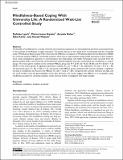Files in this item
Mindfulness-Based Coping with University Life : a randomized wait-list controlled study
Item metadata
| dc.contributor.author | Lynch, Siobhán | |
| dc.contributor.author | Gander, Marie Louise | |
| dc.contributor.author | Nahar, Ananda | |
| dc.contributor.author | Kohls, Niko | |
| dc.contributor.author | Walach, Harald | |
| dc.date.accessioned | 2020-10-05T12:30:06Z | |
| dc.date.available | 2020-10-05T12:30:06Z | |
| dc.date.issued | 2018-02-20 | |
| dc.identifier | 266039012 | |
| dc.identifier | c25e8c77-80f4-4783-ab96-71e61590ff74 | |
| dc.identifier | 85044787280 | |
| dc.identifier.citation | Lynch , S , Gander , M L , Nahar , A , Kohls , N & Walach , H 2018 , ' Mindfulness-Based Coping with University Life : a randomized wait-list controlled study ' , SAGE Open , vol. 8 , no. 1 . https://doi.org/10.1177/2158244018758379 | en |
| dc.identifier.issn | 2158-2440 | |
| dc.identifier.uri | https://hdl.handle.net/10023/20723 | |
| dc.description.abstract | The benefits of mindfulness for a variety of clinical and nonclinical populations are well established and there is growing interest in the potential of mindfulness in higher education. This article reports on the results from a randomized wait-list controlled study of Mindfulness-Based Coping With University Life (MBCUL), an adaption of Mindfulness-Based Stress Reduction (MBSR) for university students. MBCUL is an 8-week program, which aims to help students bring mindful awareness to their academic work, stress management, approach to communication and relationships, and health. Participants were recruited from the general student body at the University of Northampton (United Kingdom) and were randomized into mindfulness or control groups. The mean age for students in the combined MBCUL group was M = 25.07, SD = 8.25 (18-50), and M = 28, SD = 7.26 (20-41) in the control group. A significant decrease in anxiety, F(1, 21) = 7.82, p =.01; depression, F(1, 22) = 4.15, p =.05; and perceived stress, F(1, 22) = 9.65, p =.01, was found in the MBCUL group compared with controls. Similarly, a significant increase in mindfulness was found in the MBCUL, F(1, 20) = 16.32, p =.001, compared with controls. Attrition was high, and the small numbers limit the generalizability of the data. However, the results suggest that MBCUL is an acceptable, useful mindfulness program for university students, which warrants further investigation with larger samples. | |
| dc.format.extent | 7 | |
| dc.format.extent | 80909 | |
| dc.language.iso | eng | |
| dc.relation.ispartof | SAGE Open | en |
| dc.subject | Meditation | en |
| dc.subject | Mindfulness | en |
| dc.subject | Students | en |
| dc.subject | University | en |
| dc.subject | LB2300 Higher Education | en |
| dc.subject | RA0421 Public health. Hygiene. Preventive Medicine | en |
| dc.subject | Arts and Humanities(all) | en |
| dc.subject | Social Sciences(all) | en |
| dc.subject | NDAS | en |
| dc.subject | SDG 3 - Good Health and Well-being | en |
| dc.subject.lcc | LB2300 | en |
| dc.subject.lcc | RA0421 | en |
| dc.title | Mindfulness-Based Coping with University Life : a randomized wait-list controlled study | en |
| dc.type | Journal article | en |
| dc.contributor.institution | University of St Andrews. School of Medicine | en |
| dc.contributor.institution | University of St Andrews. Education Division | en |
| dc.identifier.doi | https://doi.org/10.1177/2158244018758379 | |
| dc.description.status | Peer reviewed | en |
This item appears in the following Collection(s)
Items in the St Andrews Research Repository are protected by copyright, with all rights reserved, unless otherwise indicated.

